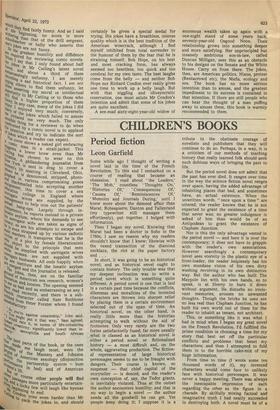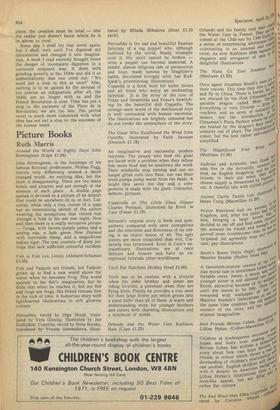CHILDREN'S BOOKS
Period fiction
Leon Garfield
Some while ago I thought of writing a novel laid in the time of the French Revolution. To this end I embarked on a course of reading that became an obsession. I read about the Leaders,' 'The Mob,' countless 'Thoughts On,' Histories Of," Consequences Of,' ' Causes Of,' 'Reminiscences Of,' Memoirs and Journals During,' until I knew more about the damned affair than Marat, Robespierre, Danton and Talleyrand (my typewriter still manages them effortlessly), put together. I bulged with information.
Then I began my novel. Knowing that Marat had been a doctor in Soho in the 1780s, I saw no reason why my readers shouldn't know that I knew; likewise with the vexed transaction of the diamond necklace, the riot at the paper factory and . . .
In short, it was going to be an historical novel; and an historical novel ought to contain history. The only trouble was that my deepest inclination was to write a period, novel which is something quite different. A period novel is one that is laid in a certain past time because the conflicts, dilemmas and moralities of the invented characters are thrown into sharper relief by placing them in a certain environment selected out of the span of time. An historical novel, on the other hand, is really little more than the historian attempting to walk without the aid of footnotes. Only very rarely are the two forms satisfactorily fused; far more usually what is classed as an historical novel is either a period novel or fictionalised history — a most difficult and, on the whole, aggravating production. The fictional representation of large historical personages seems to me to be fraught with dangers. Their course is known, so suspense — that chief capital of the storyteller — is denied; and the reader's own conception of, say, the Tudor giants, is inevitably violated. Thus at the outset the author encounters hostility; and that is no way to begin a novel — the author needs all the goodwill he can get. Yet people keep doing it; I suppose it is a tribute to the obstinate courage of novelists and publishers that they will continue to do so. Perhaps, in a way, it is a criticism of our methods of teaching history that really learned folk should seek such dubious ways of bringing the past to life.
But the period novel does not admit that the past has ever died. It ranges over time in the way the science fiction novel ranges over space, having the added advantage of inhabiting places that had, and sometimes have, an actual existence. When the unwritten words, "once upon a time" are uttered, the reader knows that he is not expected to grant the existence of a time that never was; no greater indulgence is asked of him than would be of an Antipodean to grant the existence of Clapham Junction.
Nor is this the only advantage vested in the period novel — and here it is over the contemporary; it does not have to grapple with the reader's own associations. However searchingly a contemporary novel sees eternity in the plastic eye of a front-loader, the reader helplessly has his own mundane vision of his own dirty washing revolving in its own distinctive way. But the author who has built The Maypole Inn with his own hands, so to speak, is at liberty to burn it down without argument. He disturbs no irrelevant memories, arouses no unwanted thoughts. Though the bricks he uses are no less real than Clapham Junction, he has built his own world out of them for the reader to inhabit as tenant, not architect.
This, or something like it was what I had in mind when I began my great novel on the French Revolution. I'd fulfilled the prime condition in choosing a time for my story that best set off the particular conflicts and problems that beset my characters; and then I attempted to fold them in to the horrible cake-mix of my huge information.
From time to time (I wrote some ten thousand words of it), my invented characters would come face to unlikely face with historical personages. It was never a happy meeting. There was always the inescapable impression of each regarding the other as the figure in a charade. By skilfully mixing factual and imaginative truth I had neatly succeeded in destroying both. A novel must be of a piece; the creation must be total — else the reader just doesn't know where he is or whom to trust.
Some day I shall try that novel again; but I shall wait until I've digested my information and changed it into imagination. A book I read recently brought home the danger of incomplete digestion in a curiously poignant way. It dealt with grinding poverty in the 1820s and did it so authoritatively that one cried out: "We must put a stop to this at once!" Alas, nothing is to be gained by the arousal of too precise an indignation; after all, the 1820s are no longer with us and the French Revolution is over. Time has put a stop to the excesses of the Place de la Revolution; we are too late. The period novel is much more concerned with what time has not put a stop to: the excesses of the human heart.











































 Previous page
Previous page